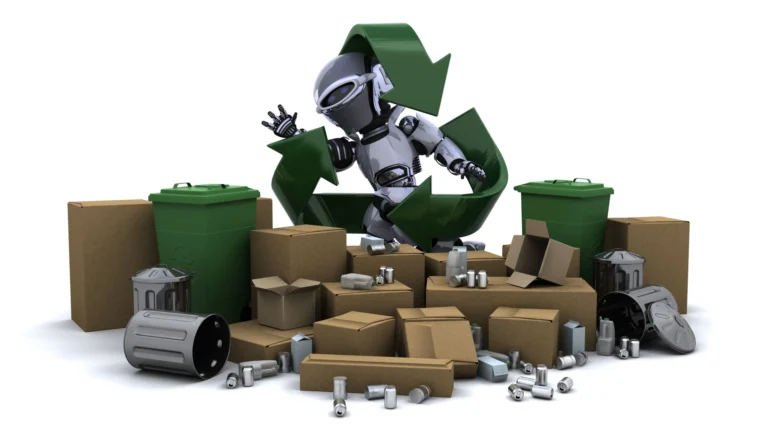Introduction
Gone are the days when VHS tapes were the crown jewels of home entertainment, with their bulky silhouettes a staple beside every TV. But as technology advanced, these tapes faded into obscurity, leaving behind just nostalgia and a significant environmental footprint. Learning how to recycle VHS tapes is more than a nod to their bygone era; it’s a necessary action to prevent the harmful impact of their non-biodegradable components on our planet.
As we consider the importance of this endeavor, we’re reminded of VHS tapes’ dual legacy: one marked by the joy of home movies and the other by the pressing need to mitigate their impact on our planet. Now that they are replaced by digital formats, recycling VHS tapes helps clear your attic space while contributing to a healthier environment. Let’s check out the deets!
Why Recycle VHS Tapes? Unraveling The Hidden Hazards of VHS Tapes
Toxic Secrets of a Bygone Era
VHS tapes are like time capsules from the past, but unfortunately, they hide a secret that’s not so fun. These tapes are made from a complex mix of plastics and metals that were not designed with the end of their lifecycle in mind. At the core of a VHS tape is the mylar tape, a durable and flexible material that allows for the magnetic recording of video. However, this mylar tape is coated with chromium—a toxic metal that poses significant environmental risks when they are disposed improperly.
If we throw VHS tapes into the trash, they ultimately find their way to the landfills. As they degrade, the hazardous substances leach into the soil and water sources, contaminating the ecosystems, harming animals, plants, and even people.
Since VHS tapes are hard to recycle (because of all the different materials mashed together), you need to find special places or organizations that know how to handle them right. When we recycle VHS tapes properly, we stop those harmful materials from getting into the environment and help keep our planet safer and cleaner for everyone. It’s a way of making sure that our love for old movies doesn’t end up harming Mother Earth.
The VHS Legacy: A Mountain of Magnetic Tape
At their peak, VHS tapes dominated home entertainment, with millions produced annually to satisfy global demand. Today, a staggering number of these tapes — likely in the billions — reside in landfills worldwide. This presents a significant challenge for waste management, as the blend of plastics, metals, and toxic substances in VHS tapes complicates recycling efforts and poses a threat to the environment. The slow decomposition of these materials means they can leak harmful chemicals into the soil and groundwater for decades, impacting ecosystems and human health.
The sheer volume of VHS tapes discarded indicates the pressing need for sustainable disposal solutions. It’s crucial to address this legacy of the analog era by supporting specialized recycling programs and exploring innovative ways to repurpose or safely dismantle the tapes so they don’t leave a lasting impact on the planet.
How to Recycle VHS Tapes?
Can VHS Tapes be Recycled?
Yes, VHS tapes can definitely be recycled, though it has its own set of challenges. Recycling these tapes is complicated due to their complex material composition. However, there are a good number of facilities equipped with the right machinery to effortlessly carry out the process.
Challenges in Recycling VHS Tapes
VHS tapes are a mix of plastic, metal, and magnetic tape, making them a tricky concoction for recycling centers. This combination of materials requires specialized processes to dismantle and recycle each component effectively. Such complexity is the reason why VHS tapes are directed to landfills instead of being recycled, as not all facilities are equipped to deal with the technical difficulties of safely processing these materials.
A Tale of Two Components: Casing vs. Magnetic Tape
The VHS tape consists of two main parts: the plastic casing and the magnetic tape inside. The casing is made from #5 polypropylene which is generally easier to recycle and can be handled by more conventional recycling facilities. On the other hand, the magnetic tape poses a greater hurdle. It’s coated with hazardous materials, including chromium, which requires specialized recycling processes to handle safely. Such facilities are rare due to the complexity and cost of the process.
This stark contrast in the recyclability of VHS tape components highlights the importance of separating them before recycling. While the casings can easily find new life, the magnetic tapes need a more careful approach. All we need is to understand these challenges and design more sustainable disposal solutions for VHS tapes to mitigate their environmental impact.
How to Dispose of VHS Tapes: Preparatory Steps
Disassembling the Past: Separating VHS Components
For VHS tapes disposal, it’s essential to start by separating their main components: the plastic casings and the magnetic tapes. Here’s a step-by-step guide to disassembling these once-popular items safely:
- Choose a well-ventilated area and lay down a newspaper or a cloth to catch any debris.
- Wear gloves to protect your hands from sharp edges, and consider putting on a mask to avoid inhaling dust.
- Now, you’ll need a small screwdriver to open the casing. Some tapes are simply snapped together and can be carefully pried apart even without tools.
- Use the screwdriver to remove the screws or gently pry the casing apart at its seams.
- Once open, remove the magnetic tape spool from the casing. The plastic casing is recyclable in most curbside programs, but the tape itself requires special handling.
Magnetic Tape: Handle with Care
The magnetic tapes found in VHS tapes are more than just carriers of nostalgia; they literally turn into environmental villains if not disposed of correctly. These tapes are coated with toxic chemicals and heavy metals, making them both difficult to recycle and dangerous to our ecosystem. Here’s what you can do to make sure you stay away from making such mistakes:
- Throwing magnetic tapes in the bin risks polluting landfills and, consequently, nearby water and soil. So, never do that.
- Reach out to local e-waste recycling centers or specialized facilities that can handle the complex process of recycling or disposing of magnetic tapes.
- Some companies and nonprofits offer mail-in or drop-off programs specifically for tapes and other difficult-to-recycle items. Try to search them out.
- Check with local or online thrift stores like Goodwill if they accept VHS tapes. If they do, you can pass on your memories in the most mindful way.
Where to Recycle VHS Tapes: The Quest for the Right Recycler
Finding a VHS-Savvy Recycling Center
Finding a place to recycle VHS tapes might feel like a hassle, but honestly, it is pretty manageable. Start your search with online resources like Earth911’s Recycling Search tool or your local government’s waste management website. These platforms can help you identify recycling centers equipped to handle VHS tapes.
However, don’t rely solely on online information. Taking the initiative to contact these facilities directly—be it through a phone call or an email—can confirm their capability to process VHS tapes. It also gives you an opportunity to inquire about any specific preparatory steps needed before you drop off your tapes.
Choosing The Green Guardians: The Importance of Eco-Certified Recyclers
Opting for recycling facilities that adhere to rigorous environmental standards and certifications can make your recycling efforts fuss-free. These eco-certified recyclers ensure that your VHS tapes are handled in an eco-friendly manner, minimizing any potential harm to the environment.
All you have to do is look for certifications or standards that specifically mention electronic waste or hazardous materials handling, as these indicate a recycler’s proficiency in dealing with complex waste like VHS tapes. Certifications such as e-Stewards or R2 (Responsible Recycling) are good indicators of a facility’s commitment to high environmental and safety standards.
VHS Tape Disposal: Exploring Alternative and Innovative Disposal Options Beyond Recycling
Community and Specialized Facilities
Recycling centers and e-waste facilities offer a viable solution for those looking to dispose of VHS tapes responsibly. Many communities also host e-waste collection events, providing a convenient and responsible way to discard these tapes and other electronic waste. These options ensure that VHS tapes are processed in a manner that’s safe for the environment, preventing harmful materials from contaminating soil and water.
Creative Rebirth: Repurposing VHS Tapes
For those of you beaming with creativity, VHS tapes can be a great medium for DIY projects. Imaginative ideas can breathe new life into old VHS cases and tapes, transforming them into home decor, functional art, or even fashion accessories. From crafting bookshelves and lampshades out of VHS cases to weaving tape into stunning canvases, the possibilities are endless. These projects not only divert waste from landfills but also celebrate the aesthetic and nostalgic value of VHS tapes in innovative ways.
A New Home: Donating VHS Tapes
Donating VHS tapes can also extend their usefulness. Schools, libraries, and vintage shops may welcome these tapes, especially if they contain educational content or rare films. To find a new home for your tapes, research organizations and institutions that accept donations if the tapes are in good condition. This gesture supports education and nostalgia, keeping the legacy of VHS alive.
Preserving Treasured Memories the Digital Way
For those cherished memories stored on VHS tapes, converting them to digital formats is a way to ensure longevity and ease of access. Various services offer professional digitization, while DIY methods involving converting hardware and software are available for those who prefer a hands-on approach. This transition not only safeguards precious memories from the physical degradation of tapes but also adapts them to contemporary viewing methods, making it easier to share and enjoy old footage with new generations.
Fostering Responsible Disposal Globally
If you’ve got old VHS tapes lying around and want to get rid of them responsibly, here’s what you need to know. Different places have different rules for recycling e-stuff, like VHS tapes. Start by looking up recycling information for your area online or call up your local waste management department to see what they say about VHS tapes.
However, before you hand over your tapes, ask the recycling center how they deal with the tricky parts of VHS tapes, like the plastic and metal bits. This is to make sure they’re not just ending up somewhere they shouldn’t. By asking these questions, you’re doing your part to help the planet.
So, getting your VHS tapes recycled means doing a little bit of homework and asking the right questions. It’s all about making sure your old tapes are taken care of in a way that’s good for the planet.
Mobilizing Communities for VHS Recycling
Getting your community involved in VHS tape recycling can make a big difference, and it all starts with you. Share your newfound knowledge about recycling these old tapes so you can help others understand why it matters. Talk to your friends, family, and any local groups you’re part of about how VHS tapes can be recycled and why it’s essential for protecting our environment.
When people come together to act, the impact is powerful. Educating those around you not only spreads the word but can also inspire others to make positive changes in their habits. Imagine organizing a community-wide recycling drive or setting up a local drop-off point for old tapes. Actions like these can significantly reduce waste and encourage sustainable disposal practices.
Leading by example is one of the best ways to contribute to environmental conservation efforts. Encourage, inspire, and lead your community towards greener choices. Together, we can make a big difference in conserving our planet for future generations.
Final Thoughts…
That pile of VHS tapes collecting dust in your home has more purpose than just being a reminder of past entertainment. Taking the initiative to transform these tapes from clutter to a cause not only frees up space but also protects our planet from the harmful effects of improper disposal. Let’s give them a chance to live a new life through selling, donating, or recycling to reduce waste and prevent toxic substances from damaging our ecosystems. This journey towards responsible disposal starts with you. So, search for recycling services or donation centers that are ready to accept these tapes and join the movement towards a cleaner, more sustainable world.




Be Good Do Good – Fashion, The Right Way
Get the Be Good newsletter straight to your inbox. Learn about the fashion industry’s burning problems and sustainability tips, as well as new sustainable and ethical brands.